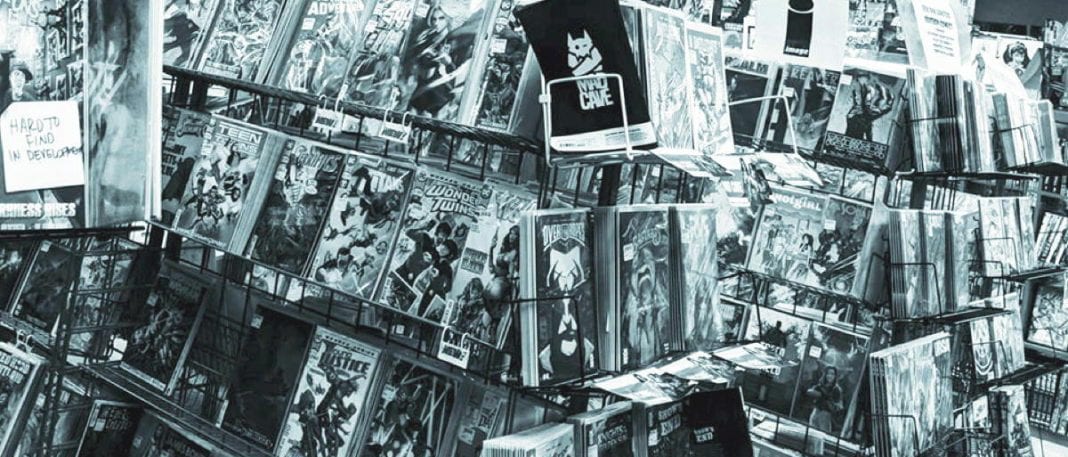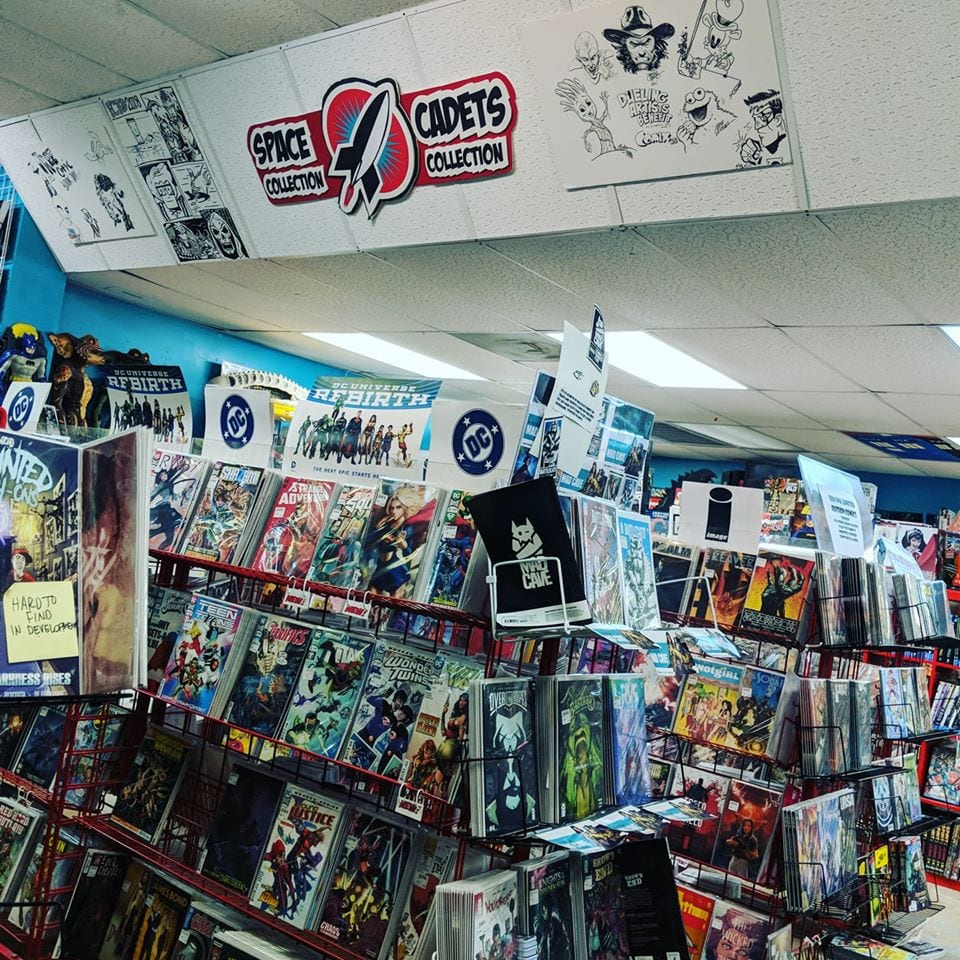In my write up of the Steve Geppi talk the other day, I mentioned that he fleetingly touched on the idea of a Bookshop.org-like service for periodical comics. I went back and jotted down his thoughts, which came while discussing Brian Hibbs’ question of access to new comics for stores that were closed, which Geppi agreed was a tough spot for Brian.
“As it unfolds maybe there is some trickle down effect of this…one of the ideas the ABA has been using is they have Ingram fulfilling orders to consumers but the retailer gets credit for it. I don’t know the ins and outs but it’s concept where you can’t service your customers right now but they could get them by UPS or mail…I think they have done $4.5 million business so far. People could order a book and because they are loyal to Brian, they want to give him the business and somebody fulfilled it for them. If Diamond could do that…I know it would be touchy because people would be worried we were stealing their customers, but after 38 years we’ve proven we’re not doing that.”
Let’s recap the Bookshop.org story a bit. Originally planned to launch long before the pandemic was a thing, Bookshop was a way to support indie bookstores. The idea is as simple as Geppi puts it: a shop makes a storefront with new books for sale. A consumer orders the book, and Ingram, the largest book distributor in the country, fulfills the order, and the retailer gets 30% of the cover price.
Simple.
When I first wrote about Bookshop a few weeks ago, it had made nearly half a million dollars for indie bookstores. Two weeks later it’s up to $1,125,695.43. Not a fortune but not nothing either.
And more media outlets are catching on. ‘The little book sellers that could: How indie stores managed to take a slice of Amazon business‘ wrote the Washington Post. This is where Geppi got the $4.5 million in sales figure – the $1.1 million is the amount sent to bookstores.
But a few independent retailers have rapidly pivoted toward e-commerce, in some cases using strikingly low-tech analog systems to retaliate against Amazon, which itself went live as a small online retailer of books 25 years ago.
These businesses may not beat Amazon at its own game, but with some creativity and customer goodwill, they might survive the crisis and come out with some much-needed upgrades. (Amazon chief executive and founder Jeff Bezos owns The Washington Post).
“We don’t have to beat Amazon. We don’t even have to come anywhere close to Amazon,” said Hunter, who has other jobs as the publisher of a small press called Catapult and the book website Literary Hub. “My goal is to get just 1 percent of Amazon’s sales.”
Hunter is Andy Hunter, Bookshop’s founder. Another even more laudatory piece from Inside Hook declared ‘Thanks to Bookshop, There Is No Reason to Buy Books on Amazon Anymore.’
The lifeline in question is called Bookshop. In simple terms, it’s a super clean, user-friendly online bookstore whose raison d’être is supporting independent bookstores — not simply with exposure or resources (though that’s certainly a factor), but with cold hard cash.
Implicitly? For the first time in 25 years — since Jeff Bezos launched Amazon as “Earth’s biggest bookstore,” effectively waging war against all booksellers (from chains to indies) and devouring market share at all costs until it owned about half of all new book sales — independent bookstores are fighting back, not just with expertly curated tables or eloquent shelf talkers, but with Amazon’s own tactics. And with Bookshop, they just might win.
“There are almost 2,000 bookstores in the country, and only about 150 of them have good online shopping platforms,” Andy Hunter, CEO and founder of Bookshop, tells InsideHook. “That leaves a lot of stores that haven’t adapted, and Amazon’s kind of eating their lunch.”
While we’re ignoring the consumer appeal of Amazon’s deep discounts, with Amazon becoming more and more of a looming presence in our lives, some people will want to support independent retailers. (The Beat has used Amazon affiliate links in the past, but will be switching to Bookshop, as have the New York Times and other media outlets.)
A few comic shops are setting up storefronts on Bookshop.org, and for those that haven’t got good e-commerce of their own, it’s a tidy way to make some money.
As Geppi alluded to, a system like this for periodical comics would have meant…..a very different time for comics shops over the last six weeks.
But the simplicity of Bookshop.org’s model isn’t so simple to some people. If you’ve heard me on a podcast over the last few weeks you probably heard me say the following, so sorry for the repetition, but the comments on my first Bookshop.org story absolutely boggled my mind with the confusion they evinced.
Jamie Coville, a respected comics journalist and this year an Eisner judge, wondered if this was like AbeBooks.com, except Ingram mailed it out. AbeBooks.com is sort of like Amazon for used books, with multiple sellers offering used or new books. And as Jamie mentioned, it’s a cataloging system for individual stores. So….kinda?
Brian Hibbs came by, as he always does (and I do appreciate it) and mostly found it a good idea but noted “Awful margin, though, and 100% not sustainable, esp if it encourages any level of channel-creep.”
He’s right that 30% is a lot less than comics shops make from ordering books and sending them out themselves, but it’s also kind of free money…you just put up a link and if someone uses it, you make money. All the hassle is gone.
Commenter JTL had the oddest take of all, wondering “what percentage of the books shipped through this are POD through Lightning Source, which may not be viable for the high quality art printing necessary for comics.” To be fair, JTL works with Ingram’s POD system, so maybe they weren’t familiar with Ingram’s position as (to put it simply) the Diamond of books. Or as the pr puts it “The company has the industry’s largest active book inventory with access to 7.5 million titles. The markets they serve include booksellers, librarians, educators and specialty retailers. Ingram employs approximately 3,000 people worldwide.”
These are just books. Book books. Not POD.
As these comments show, Ingram’s position isn’t very well known in the comics industry, so the confusion was a bit understandable.
Bookshop.org’s basic concept is sort of a little like the now-disgraced ComicHub solution, although Comichub embraced the scary digital and not simple fulfillment – something way bigger than they could have done, to be sure. But one wonders if someone had proposed THIS solution instead, if retailers would have had any interest in it?
In all the brouhaha over digital or DC destroying comics retailers, I wonder if enough attention has been paid to the fact that by the time Diamond reopens on May 20th, periodical comics will have been unavailable around the world for seven weeks, aside from DC’s “thin slate of garbage.” Brian’s abiding concern about “channel creep” is extremely valid, but what about apathy? While we all hope for pent up demand when things begin to find the new normal, a few people will inevitably decide they just don’t want or need floppies any more.
Diamond’s shut down and state mandated store closures have affected the comics pipeline all the way around. Pencils down orders and furloughs (or worse, lay offs) have hit almost every company. A “Comicshop.org” type solution for comics would certainly not have mitigated that entirely – bookstores and publishers are reeling as well – but it might have helped a bit.
In our weekly podcast for Publishers Weekly, More to Come, I interviewed retailer Jen King this week and asked her what she thought of this “Bookshop.org for floppies” idea. “On the face of it, it sounds like one of the most brilliant things ever,” she said without hesitating much.
I realize that I’m sitting here with hindsight and all the time in the world to sit around and think about things. But we are coming around to the end of the first act of the pandemic – not where I live, in New York, but in many areas. King’s store, Space Cadets in Texas, will be opening for customers today, with all the care and concern for safety that entails. Many other states are beginning to open up or establish timelines for when they might open. It’s just the first wave, as we’ll be dealing with the uncertainties of this disease until we have widespread accessible testing and a vaccine. But we’ll gradually begin to stagger back to business in an unfamiliar landscape.
The shops that have survived will be opening and people will be reading comics again. (Although will they be able to riffle through them on the rack? Another topic for another post, I believe.) The pipeline will begin to flow.
I’ve podcasted and been interviewed and spitballed and DM’d endlessly about the fate of comics for the six weeks I’ve been in quarantine. And for the first time, I have a solid piece of advice for the comics industry: if we do have to go into lockdowns in fits and starts, or if there are other disruptions to the industry, we need some kind of system that would provide a bookshop.org for floppies. Shutting down the pipeline for seven weeks is not a solution; we need to work together to find a better one.









Here’s an idea I’ve been asking about for YEARS:
Why can’t Diamond be the online fulfillment warehouse for comics shops?
They are the Amazon for comics shops…a distribution center.
A store selects the products featured on their electronic storefront.
Diamond handle all of the back-of-house fulfillment: processing payments, charging a service fee (Apple=30%), shipping orders, dealing with returns.
The store gets an online storefront with minimal maintenance.
Diamond handles all the IT issues.
The store offers a wider range of product (which can be ordered for customers who are standing in the store asking for something), with little risk.
The store can discover new product lines which might deserve floor space in the physical store.
Diamond moves more product, and makes more money.
The store makes more money with a few more man-hours of maintaining the merchandise offered.
Diamond has overstock? Do what they do now…offer it to stores directly, but also on these websites as “clearance”.
Question for those stores who use bookstore distribution:
Do you offer a Special Orders service?
Do you offer to order ANY book available from Ingram, even if it’s not part of your product line, like a dictionary or a cookbook? Or even those beautiful DK guides to Star Wars or Marvel?
How many of you participated in the Midnight Madness sales of new Harry Potter releases?
Retailers need to adapt. Online ordering and delivery/curb pickup is the future of mom and pop retail stores. My local comic shop is great and the owner is wonderful, and i can’t be a customer because his hours are terrible (10-5), impossibly difficult local parking situation, has no social media, or ability to order anything online and its just stuck in the 2000s in terms of how he runs a business. Life doesn’t make it possible to go to a shop like that on a regular basis and it makes it that much easier to get rid of comics from your weekly life.
Those safety precautions set up by the shop in texas are needed by also insane. I’d never want to deal with that hassle. Good luck to them. Its gonna be a wild world going forward.
I’m a bit dense on this one. So apart from the health crisis, why would an independent bookstore want a different company getting their web traffic? They basically get a referral fee while the distributor gets the customer? It seems like the TKO solution where TKO doesn’t really owe the local comic shop anything when a customer buys through their online store in the long run. Also AbeBooks is now an Amazon company. The listings are duplicates from the Amazon marketplace if I’m not mistaken.
Okay, so a little digging, and it looks like AbeBooks still functions independently from Amazon although they are a subsidiary. So the overlap in listings is because many of these used book sellers list the items on both sites. Either way amazon gets the business, just a different channel and ethos.
I don’t really see much downside to this, and it could be an completely new revenue stream for comics retailers. And I don’t see the margin as being terrible. Once you factor in rent, payroll, utilities, taxes, etc, as a percentage of unit price, that could be as much as 15 to 20%, which would make that 30% discount not nearly as far away from the usual margin as it seems. Plus… there’s no effort and no payments up front. You just sit there and get money. What’s not to like?
As per Torsten’s idea for Diamond to do this — does the industry really need Diamond to get more power over comics sales?
Comments are closed.